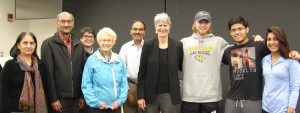The AHIMSA / NONVIOLENCE SEMINAR is a partnership between the Asian and Asian American Studies Institute and key members of the Greater Hartford Jain Center. Since 2001, this yearly seminar aspires to connect the principle of nonviolence with its practice to address contemporary concerns, holding as an ideal the Mahatma Gandhi’s legacy of social activism to achieve beneficial change in the world.
2016 “Religious Literacy and Ahimsa: Shared Means Toward the Goals of Justice and Peaceful Coexistence”
On Monday, October 3 Harvard University’s DIANE L. MOORE gave the keynote address “Religious Literacy and Ahimsa: Shared Means Toward the Goals of Justice and Peaceful Coexistence” for the Institute’s annual Ahimsa/Nonviolence Seminar. This event was also part of the UConn Reads series that focused its 2016 theme on “Religion in America.”
Dr. Moore directs Harvard Divinity’s Religious Literacy Project, coordinates the Religious Studies and Education Certificate, and serves on the Task Force for Training, Tools, and Methods at the US State Department through its Office of Religion and Global Affairs. Her current project is a Massive Open Online Course (MOOC) through HarvardX – a series entitled World Religions Through Their Scriptures. She is also the Principal Investigator for a three-year initiative entitled Religious Literacy and the Professions that is a collaboration between Harvard Divinity School and Boston University.
Opening her remarks with M.K. “Mahatma” Gandhi’s articulation of ahimsa as “nonviolence in thought, word and deed – a kind of humility that might not be easily met by the average human being, yet that aspiration guided his ‘Experiments with Truth’” and provides a framework and a means of achieving important goals. Moore’s focus on religious education is grounded in context/critical theory and seeks to cultivate (equip, inspire, empower) moral agency, such that “an open and flexible understanding of the complexity of religion helps us to understand modern affairs, the lack of which promotes negative consequences.” Her work is also informed by Paolo Freire and Johann Galtung’s optimistic view of human nature. So when we deeply examine (and not merely demonize) the conditions that create cultural violence and also examine how these conditions are allowed to be acceptable, she said, “challenging these assumptions can make way for cultural peace. We have pockets of cultural peace, but it’s not systemic.”
“Our agency matters in helping to create a hopeful view in difficult times … we have to be wholehearted and half-sure.”
 In the Q&A – both Moore and several members of the audience find frustration with the combination of arrogance and impatience that both sides of the aisle expressed in conversations about violence and religion. She reminds us that there is internal diversity and we need to look at which interpretation is in ascendency – the “outcome” can’t be our only goal. “Our agency matters in helping to create a hopeful view in difficult times … we have to be wholehearted and half-sure.”
In the Q&A – both Moore and several members of the audience find frustration with the combination of arrogance and impatience that both sides of the aisle expressed in conversations about violence and religion. She reminds us that there is internal diversity and we need to look at which interpretation is in ascendency – the “outcome” can’t be our only goal. “Our agency matters in helping to create a hopeful view in difficult times … we have to be wholehearted and half-sure.”
Diane L. Moore chaired the American Academy of Religion’s Task Force on Religion in the Schools, which conducted a three-year initiative to establish Religious Curriculum Guidelines for teaching about religion in K-12 public schools. Her book Overcoming Religious Illiteracy: A Cultural Studies Approach to the Study of Religion in Secondary Education was published by Palgrave in 2007 and she serves on the editorial boards of the journals Religion and Education and the British Journal of Religious Education. In 2014 she received the Petra Shattuck Excellence in Teaching Award from the Harvard Extension School and the Griffiths award from the Connecticut Council for Interfaith Understanding for her work promoting the public understanding of religion. She is an ordained minister in the Christian Church (Disciples of Christ).